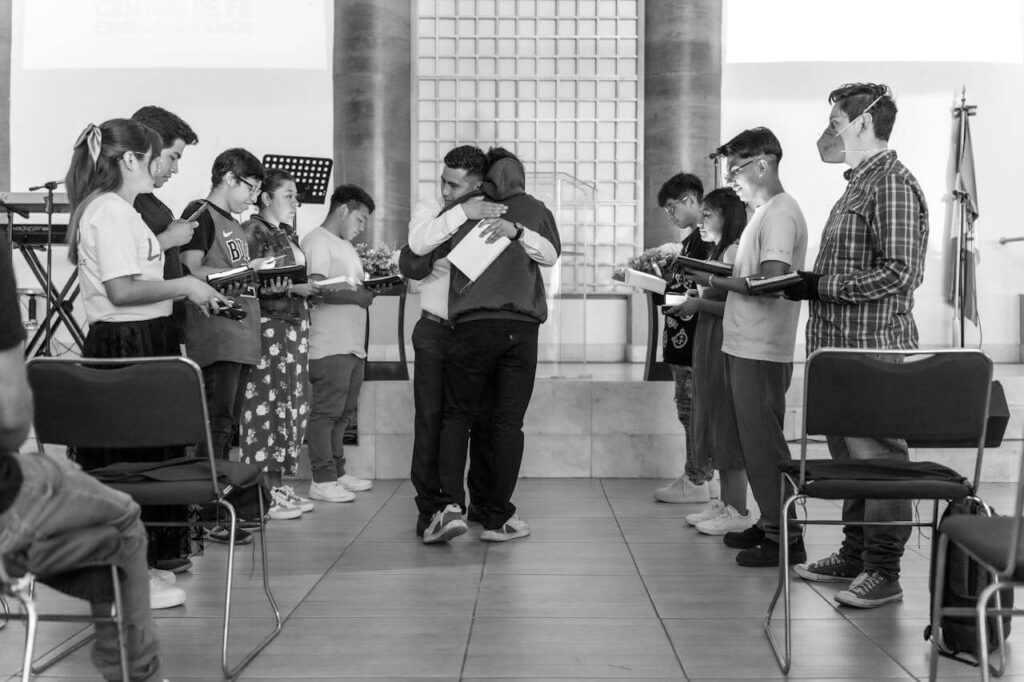Rural and small-town churches across North Carolina have a unique opportunity to strengthen their communities and fulfill their Christian mission by welcoming immigrants with open arms. As part of Hood Empowers’ commitment to the Foundation, Formation, and Faith pillars that strengthen our rural churches, this guide offers practical approaches for church leaders seeking to create inclusive congregations that serve all of God’s children. Drawing from two excellent resources, we provide faith centered strategies that empower your church to lead in building bridges across cultural differences.
The Importance of Immigrant Integration for Rural Churches
Welcoming immigrants into our rural church communities isn’t just the right thing to do—it’s a biblical mandate to “love the stranger as yourself” (Leviticus 19:34). As rural church leaders, when we actively work to integrate newcomers into our congregations and communities, we create opportunities for spiritual growth and renewal that benefit everyone:
Enhanced faith experiences through diverse expressions of worship and testimony Revitalized congregations that can serve future generations
Stronger community bonds that exemplify Christ’s love across cultural differences New opportunities for members to practice discipleship through service and hospitality Strengthened rural economies through entrepreneurship and new skills
Practical Ways for Rural Churches to Promote Integration
Drawing from CLINIC’s “12 Ways to Promote Integration in Your Community“, here are concrete actions rural church leaders can implement to strengthen their Foundation, Formation, and Faith pillars:
1. Create Welcoming Spaces in Your Church (Foundation)
Transform your church facilities into welcoming spaces where immigrants feel God’s love. Designate fellowship areas that serve as information hubs and gathering places that bridge cultural divides, demonstrating your commitment to being God’s hands and feet.
2. Form Partnerships with Other Rural Churches (Foundation)
Build coalitions with neighboring congregations and faith communities to multiply your impact. These partnerships create a network of spiritual and practical support for newcomers while strengthening the entire rural church ecosystem.
3. Develop Cultural Competency Among Church Leaders (Formation)
Offer cultural competency training for pastors, deacons, elders, and ministry leaders. Understanding diverse cultures through a biblical lens helps prevent misunderstandings and builds Christ-centered respect and empathy.
4. Provide Language Access in Worship (Foundation)
Make translation and interpretation services available during worship services and church events. Consider bilingual bulletins, scripture readings, or even occasional multilingual worship services that celebrate our unity in Christ across language differences.
5. Host English Classes as Ministry (Faith in Action)
Establish English language classes in your church facilities as an outreach ministry. This practical service opens doors for relationship-building and natural faith conversations while helping newcomers thrive in their new community.
6. Create Church Family Mentorship Programs (Formation)
Connect immigrant families with established church families who can provide spiritual encouragement, practical guidance, and help navigating local systems. These relationships often grow into deep spiritual friendships that enrich both families.
7. Celebrate Cultural Diversity as God’s Design (Faith)
Host multicultural church events that recognize how God’s creativity is expressed through diverse cultures. Include global worship music, international meals, and testimonies that demonstrate how different cultural perspectives enhance our understanding of scripture.
8. Support Immigrant Entrepreneurs in Your Congregation (Foundation)
Use church networks to provide resources, mentoring, and support for immigrant entrepreneurs. Help them navigate licensing requirements and connect with other Christian business leaders who can offer guidance.
9. Encourage Leadership Development (Formation)
Create pathways for immigrants to serve and eventually lead in church ministries. Intentional discipleship and leadership development ensures your church will remain vibrant for generations to come.
10. Meet Practical Needs with Christian Compassion (Faith in Action)
Mobilize your congregation to address health and housing challenges facing immigrant neighbors. Organize volunteer teams to help with transportation to medical appointments or assist in finding safe, affordable housing—tangible expressions of Christ’s love.
11. Support Immigrant Children and Youth (Formation)
Develop Sunday School programs and youth ministries that intentionally welcome immigrant children and teens. Consider homework help programs or tutoring ministries that support educational success and create natural mentoring relationships.
12. Lead in Building Community-Wide Understanding (Faith in Action)
Position your rural church as a bridge-builder by hosting community conversations about immigration issues from a faith perspective. Create spaces where diverse voices can be heard with respect and dignity.
Breaking Bread and Building Bridges: A Biblical Approach
Jesus often used shared meals as opportunities for ministry and community building. The “Breaking Bread and Building Bridges” approach, described in the community potluck and town hall meeting guide, offers rural churches a powerful and scripturally-grounded framework for bringing diverse community members together around the table. Here’s how your church can implement this approach:
The Spiritual Power of Shared Meals
From the feeding of the 5,000 to the Last Supper and the post-resurrection appearances, Jesus repeatedly used shared meals to teach, nurture community, and break down barriers. When rural churches host community potlucks where everyone brings a dish representing their cultural heritage, we create natural opportunities for holy conversation and connection that honor this sacred tradition.
Planning a Successful Church-Led Breaking Bread Event
1. Form a Ministry Team: Include representatives from different church committees, immigrant congregation members, established residents, and other local churches. Begin and end each planning meeting with prayer for unity and blessing.
2. Use Your Church as Sacred Space: Your rural church building is likely already a community landmark. Use your fellowship hall or sanctuary as a venue that communicates both welcome and reverence for all who enter.
3. Create a Christ-Centered Atmosphere: Arrange seating to encourage mixing among different groups. Consider round tables with biblically-inspired “conversation starter” cards that invite people to share their faith journeys and experiences.
4. Honor God’s Creativity Through Cultural Exchange: Beyond food, include worship music from different traditions, testimonies, or brief presentations that celebrate how God works through diverse cultural expressions.
5. Facilitate Spirit-Led Dialogue: After the meal, include a brief devotional on biblical hospitality before facilitating a town hall discussion focused on how the church can better serve all community members. Create a safe space where all voices are heard and respected as part of God’s family.
From Faith Discussion to Faithful Action
The true power of these events comes when Spirit-led discussion transforms into concrete ministry action:
Form ministry teams to address specific needs identified during discussions
Create a church-based welcome resource directory specifically designed for newcomers Establish regular prayer and action follow-up meetings to maintain spiritual momentum
Develop a church integration ministry plan with measurable goals, timelines, and regular opportunities to celebrate progress
Identify opportunities to involve immigrants in existing church ministries and leadership
Success Stories and Kingdom Impact
Rural churches implementing these approaches have seen God move in remarkable ways:
“Our Breaking Bread events transformed our rural congregation from an aging church with declining attendance to a vibrant, multi-cultural faith family where everyone feels called to ministry. What began as outreach has become the lifeblood of our church.”
– Pastor, Rural North Carolina Church
“Starting with small potlucks in our fellowship hall after Sunday service, we’ve grown to hosting quarterly cultural celebration worship services that draw visitors from across three counties. More importantly, we’ve seen spiritual renewal in our congregation as longtime members and newcomers learn from each other’s faith journeys.”
– Church Elder, Small-Town Ministry
“When we opened our doors to immigrant families, God blessed us with new Sunday School teachers, worship leaders, and five new deacons who bring fresh perspective to our church leadership. Our congregation is now growing for the first time in twenty years.”
– Rural Church Revitalization Committee Chair
Getting Started in Your Rural Church
Even small ministry initiatives can make a big difference in your rural church context. Consider starting with:
1. A Sunday fellowship meal with a deliberate invitation to immigrant neighbors 2. A “church welcome team” that receives special training in cross-cultural hospitality 3. A prayer initiative that specifically lifts up immigrant communities and their needs 4. Bible studies that explore God’s heart for the stranger and foreigner
5. Regular cultural competency workshops for church leadership
Resources for Your Church’s Journey
Hood Empowers is committed to supporting your rural church’s ministry to immigrants. These resources provide valuable guidance as you begin:
12 Ways to Promote Integration in Your Community | Catholic Legal Immigration Network, Inc. (CLINIC)
Breaking Bread and Building Bridges Potluck and Town Hall Meeting Guide
Hood Empowers’ Rural Church Revitalization Workshops
Faith-based immigrant welcome resources
Scripture studies on biblical hospitality and welcoming the stranger
Contact Hood Empowers for personalized coaching on implementing these strategies in your specific rural church context. Our team can help you align these practices with the unique needs and opportunities in your congregation.
A Call to Rural Church Leaders
Creating welcoming faith communities is both a spiritual calling and practical ministry. It requires prayer, intentional effort, cultural humility, and a commitment to seeing diversity as God’s gift rather than a challenge. By implementing the strategies outlined in these resources through the lens of Hood Empowers’ Foundation, Formation, and Faith pillars, rural churches across North Carolina can experience revival and renewal while faithfully serving all of God’s children.
The journey toward true Christian welcome is ongoing, but with each shared meal, conversation, and collaborative ministry, we move closer to fulfilling Christ’s vision of a church where everyone—newcomers and established residents alike—can worship, grow, and serve together.
Will your church answer this call to strengthen North Carolina’s rural faith communities by welcoming the immigrants God is bringing to your doorstep?
This blog post was created by Hood Empowers’ Institute for Rural & Small-Town Ministry & Leadership, summarizing insights from the Catholic Legal Immigration Network’s “12 Ways to Promote Integration” resource and the “Breaking Bread and Building Bridges” community potluck guide. For complete information, please visit the original resources linked above or contact Hood Empowers for personalized guidance for your rural church context.



